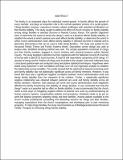| dc.description.abstract | The family is an important place for individual mental growth. A family affects the growth of every member, and plays an important role in the normal operation process of a social system. Clergy families, however, experience ministry related challenges with potential ramifications on their family stability. This study sought to address the effect of church ministry on family stability among clergy families in selected churches in Nairobi County, Kenya. The specific objectives were; to determine the extent to which the clergy‟s work as a preacher affects family stability, to establish the extent to which pastoral care work affects family stability, to determine the extent to which church administration work affects family stability in selected churches in Nairobi and to determine interventions that can be used to help clergy families.. The study was guided by the Structural Family Theory and Family Systems theory. Descriptive survey design was used to analyse data. Stratified sampling method was used. The sample population comprised of clergy and their family members engaged in church ministry with physical presence within Nairobi County. The study targeted 6 selected churches registered with the National Council of Churches of Kenya with a total of 32 local churches. A total of 166 respondents comprising of 64 clergy, 47 spouses of clergy and 55 children of clergy were included in the sample. Data were collected using a structured questionnaire and analyzed using descriptive statistical techniques. Hypotheses were tested using Spearman‟s rank correlation technique at p<.05 and regression analysis to establish the relationship among variables. The results showed that the relationship between preaching work and family stability was not statistically significant across all family members. However, it was found that there was a significant negative correlation between church administration work and clergy family stability from the viewpoint of the children. Further, a statistically significant negative relationship was obtained between pastoral care work and family stability across all family members. However, both pastoral care work and church administration work negatively affected the family functioning and stability of clergy families. It was concluded that only the clergy‟s work as a preacher had no effect on family stability. It was recommended that the church needs to find ways of mitigating negative effects of pastoral care work by professionalizing its human resource systems, compensation policies and procedures. Emphasis needs to be put on work-life balance programs targeting clergy and their families. Among options available to the church include professional counselling and debriefing sessions for clergy and their families, managing expectations from the church congregations and developing peer to peer mentoring programs. To help clergy families, the study recommended use of Multigenerational and Structural Family Therapies in enhancing clergy family stability. | en_US |

